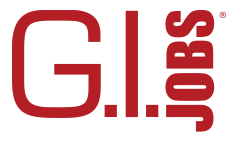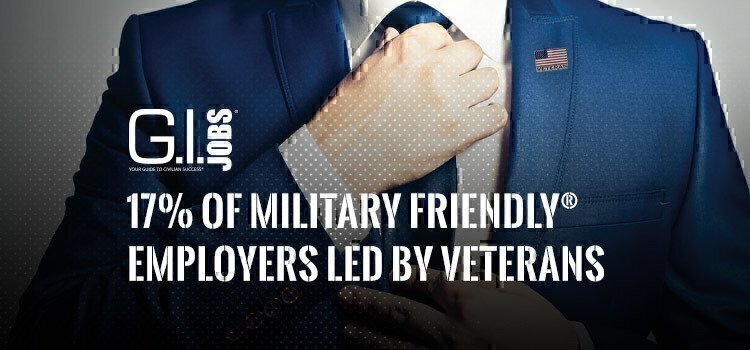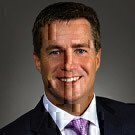#Sponsored
In December, G.I. Jobs published the 2020 Military Friendly® Employers list. We got to wondering how many of those organizations are led by military veterans.
It wasn’t hard to find out. One of the key tools that Military Friendly® uses to measure organizations’ commitment to helping America’s military, veterans and their families succeed is an extensive survey that captures details about the organization’s programs and services for the military community. And one of the survey questions is whether the organization’s leader is a military veteran.
We found that 51 of the 294 Military Friendly® Employers for 2020—17%—are led by military veterans. It came as no surprise to Josh Rosen, a National Guard officer who leads the Military Friendly® ratings program.
“It is no coincidence that our nation’s veterans are continuing to lead the charge when it comes to creating economic opportunity and building Military Friendly® programs for the military community in which they belong. This fact that a majority of Military Friendly® Employers are led by veterans shows that veterans are in fact better off for their service.”
In 2005, 59 of the S&P 500 corporations were led by military veterans, according to a report published by executive recruitment firm Korn Ferry International. That’s about 8%, down from 60% in 1980.
The same study found that corporations led by those who once wore the uniform were more likely to deliver higher average returns than the S&P 500 over one, three, five and 10-year periods. Moreover, the study revealed that chief executives who served in the military tend to survive longer on the job.
The link between service and good civilian leadership is clear.
“My military service has had a profound effect on how I approach leadership and business. In the workplace, much like during active duty, as a leader it’s your responsibility to create a vision and inspire your team to achieve it together. Leading by example, it’s up to you to motivate your team, define the action plan and execute it! To be successful in today’s changing market environment, you have to assess situations quickly and be decisive. My time with the military was vital in shaping who I am as a leader.” – Keith Creel, president and CEO of Canadian Pacific
We asked a few other veterans who lead organizations designated as Military Friendly® what impact military service had on their success as a corporate leader. Here’s what they had to say.
“My time in the Marine Corps taught me concepts that relate directly to my work as a corporate leader. First, the idea that the mission comes first, that all of us are working to serve something bigger than ourselves or our unit. In the USMC, it was all about engaging the enemy to keep America and her allies safe. In my current company we battle geologic hazards (landslides, rockfall, sinkholes, etc.) to protect people and infrastructure from danger. While we have different tools for our ‘battle,’ the shared commitment to an important mission is exactly the same. Second, the Marine Corps instilled the concept of servant leadership deeply into my way of thinking. When we went to the field, the officers ate last, and if there wasn’t enough food it was them—not the troops—that went hungry. We mirror this concept in our profit-sharing allocation in my current business. Our field guys ‘eat’ (get their profit share) first, and our senior leadership shares in any excess after the field. In down years, profit share for the field folks is relatively secure while that of senior leaders is at risk. Lastly, the Marine Corps assigns every routine process or task an ‘SOP’ (standard operating procedure). We’ve used the same concept in our business to ensure that highly critical tasks get done the right way, every single time.” – Colby Barrett, J.D., P.E., CEO, GeoStabilization International, Marine Corps, 2001-2004, Captain (O-3)
“Being an effective chief executive officer is all about understanding people and leadership. I can say without question, there is no better leadership laboratory in the world than the United States Army.” – George Krivo, Chief Executive Officer, DynCorp International, Army, 1985-2005, Lieutenant Colonel (O-5)
“The military is comprised of soldiers, sailors, Marines and airmen from all different backgrounds, races and religions. This fact alone makes the military the greatest leadership training program in the world. The skills necessary to effectively manage such a diverse group of employees are developed and engrained in the young men and women serving. These skills have helped me form lasting relationships in my community and impressions on young police officers I have supervised through the years. I recognize the value military candidates bring to the Cincinnati Police Department and we strive to remain a regional leader in military hiring and retention.” – Col. Eliot K. Isaac, Chief of Police, Cincinnati Police Department, Army, 1985-1991, Specialist (E-4)
“In the early 1970s, I had the privilege to lead a parade at West Point with my classmates in honor of the Chief of Staff of the Army General Creighton Abrams. Following the parade, a fellow cadet asked him to define leadership. He responded with two words: Lead tank. A fitting response from a warrior who commanded the lead tank battalion going into Bastogne to liberate the 101st Airborne, which was surrounded by the enemy. General Abrams embodied that true leaders always set the example, placing the needs of those they serve above all else and leaving no one behind.
General Abrams’ life and leadership have made an indelible impact on both my military and business careers. Our Warfighters sacrifice so much and my Exchange teammates inspire me every day with their dedication and sense of duty in serving them.” – Tom Shull, Director/Chief Executive Officer, The Exchange, Army & Air Force Exchange Service, Army, 1973-1985, Army Reserve, 1985-1992, Major (O-4)
“For those of you currently serving or who have previously served in the military, I want to share from my personal journey that your experience matters. My military education and service has been instrumental in my success in the marketplace. The Army taught me discipline, leadership, teamwork, commitment to excellence, and a drive to win. I am forever grateful to the Army for the many lessons I learned that I continue to apply today, all the lifelong friends I’ve made, and for the opportunity to serve my country.” – Larry Smith, President, Tokyo Electron US (TEL), Army, 1984-1989, Captain (O-3)
*Although not part of the 2020 Military Friendly® Companies list (the company did not apply for designation), we asked JDog Brands founder and CEO his thoughts about how military service impacted his success in building a successful portfolio of national franchise brands.
“Military training taught me RESPECT, INTEGRITY AND TRUST, which I use and teach everyday as a CEO. I also learned how to outwork and out-hustle everyone.” – Jerry Flanagan, Founder/CEO, JDog Brands, Army, 1987-1989; National Guard, 1991, Specialist (E-4)
For the full list of 2020 Military Friendly® Employers, visit MilitaryFriendly.com.
Check out this story and much more for FREE in the digital March 2020 issue of G.I. Jobs magazine!
READ NEXT
11 of the Most Dangerous Jobs in the U.S. Military
9 Most Irritating Things Vets Hear When They Head Off to College
10 Jobs That Pay $100K Without a College Degree





